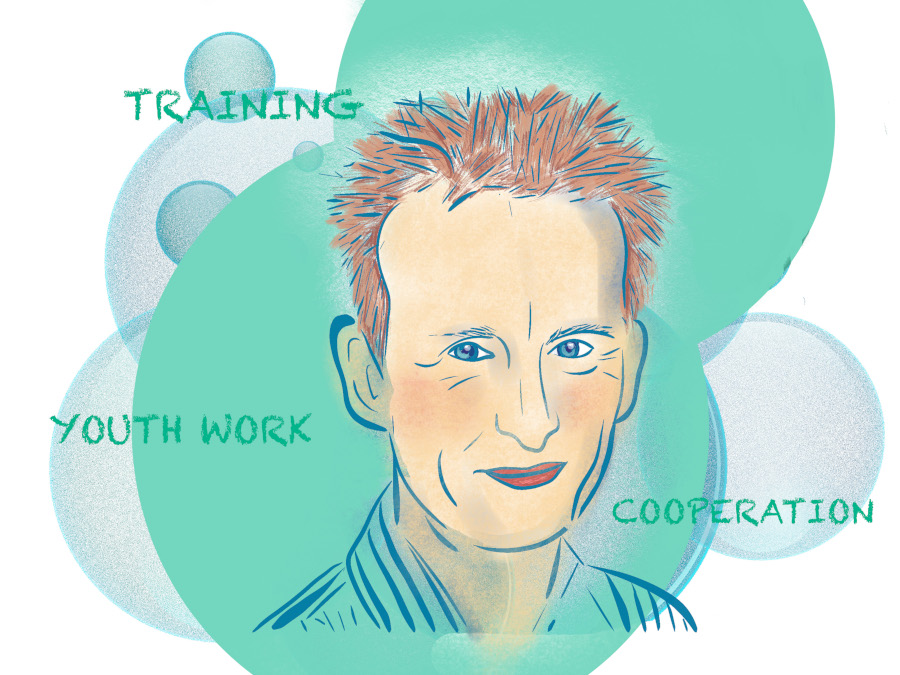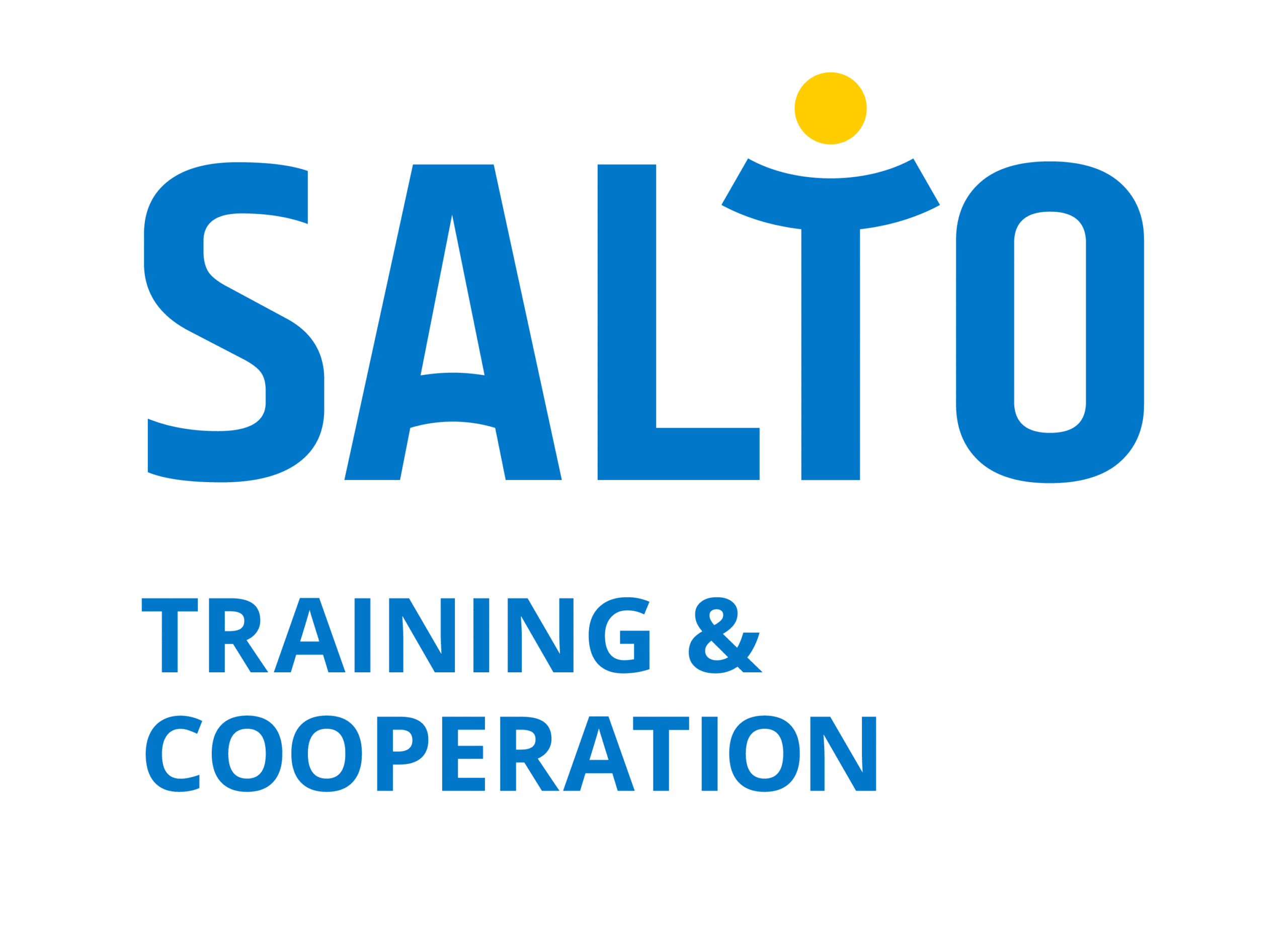The journey incredibly enriching for personal and professional life.
Udo Teichmann
Training and Cooperation (Bonn)

National Agency Supporting Training and Youth?
In 2000, the European Commission came up with the idea that it would be good for the National Agencies of the Youth programme to receive central support for their work in specific areas. After few months the first 4 SALTO-YOUTH Resource Centres were established, in Belgium, Germany, France and the United Kingdom. This was an opportunity for me to switch to a very international working context after 4 years of implementing the programme on a more national level. Working with all the National Agencies, the European Commission, trainers and youth workers across Europe was a real challenge and at the same time a very exciting and eventful job.
When we had been considering how to call the new structure beginning 2001, Frank Marx, a colleague in charge at the European Commission at the time, had a humorous idea that we could call ourselves NASTY (National Agency Supporting Training and Youth). But as we didn’t want to be called nasty for the rest of our careers in this field of work, we finally agreed on SALTO (Support, Advanced Learning and Training Opportunities). It’s great to see that we have found a catchy name that is nowadays recognised throughout Europe as an acronym for quality and support for youth work, education and training.
But there was no coordinating, supporting structure...
In 2001 and 2002, the European Commission assigned the SALTOs 4 different topics on which we were asked to offer training courses for youth workers from all over Europe. It quickly became clear that we were unable to develop sufficient expertise as a European Resource Centre due to constantly changing topics and we began to consider which fixed general topics should the SALTOs drive forward in the coming years. For the SALTO Resource Centre in Germany, the topic of youth worker competence development was an important issue to help develop quality in the youth field cross Europe.
In particular, we supported the National Agencies, as since year 2000 they had received dedicated budget for competence development of youth workers, but there was no coordinating, supporting structure. Gradually the developments we initiated with our Resource Centre developed into the “European Training Strategy”. It contained among all the competence profiles of youth workers and trainers, different kind of standard, module training courses and other large events on different topics and for different target groups in the youth field. And we also invested into the very well visited SALTO website with its flagship databases: European Training Calendar, Toolbox, TOY and Otlas.
In 2007, the development and introduction of the Youthpass was added as a task for the SALTO Training and Cooperation Resource Centre. The Youthpass became the programme’s instrument for making the gained competences visible and recognised. In 2019 the one million Youthpass certificate was created.
I am infinitely grateful to everyone I was able to meet during this time and with whom I was able to work on many different projects
The SALTO journey I walked till 2019 was incredibly enriching for my personal and professional life. I was able to get to know an incredible number of interesting and very different youth work practices and perspectives throughout Europe. I met so many great people, experienced very interesting events with them and spent wonderful evenings together. I made many new friends and felt more and more like a European and less and less like a German. For these 19 years of SALTO, I am infinitely grateful to everyone I was able to meet during this time and with whom I was able to work on many different projects. After so many years of intensive travel, I am also glad that I have been able to return to direct programme implementation at my own request since 2020 and that I have been able to advise and support many European consortia in their Key Action 2 projects with their aims of organisational development.
In my opinion, this central task of the SALTOs has not changed
I am looking on my SALTO Training and Cooperation resource centre colleagues in our office with one eye crying and one eye laughing for few years now. Unfortunately I don’t get to regularly meet my colleagues from the other SALTOs and National Agencies anymore. I always think back to the good times I had in the SALTO family, but I am also glad that I no longer have to fulfil myself the increasingly complex requirements of the programme and its managers. A wide variety of requirements come from many different directions, often contradictory and unfortunately, in practice, not actually sufficiently achievable with the resources available for the SALTO Resource Centres.
I would be delighted if the SALTO Resource Centres can continue to pursue the needs of the National Agencies as their core task despite the demands placed on them from various other sides. In my opinion, this central task of the SALTOs has not changed, because without the programme the SALTOs would not exist and without the National Agencies the programme cannot be successfully implemented throughout Europe and beyond.
The next programme starting in 2028 will be my last
My name is Udo Teichmann, I live in Germany and studied social pedagogy. After my studies, I worked for a large German charity organisation for few years, organising holidays for children and youth and training youth workers to support youth during their vacations. I have been working for JUGEND für Europa, the German National Agency for the EU youth programmes, since 1996 and was initially responsible for the funding area of youth exchanges and training measures for youth workers. I’ve now been working for JUGEND für Europa for 29 years. I’ve experienced quite a few programme periods and I’m looking forward to the next programme starting in 2028. It will be my last, even if I don’t yet know exactly what I’ll do with all my free time after being retired.

